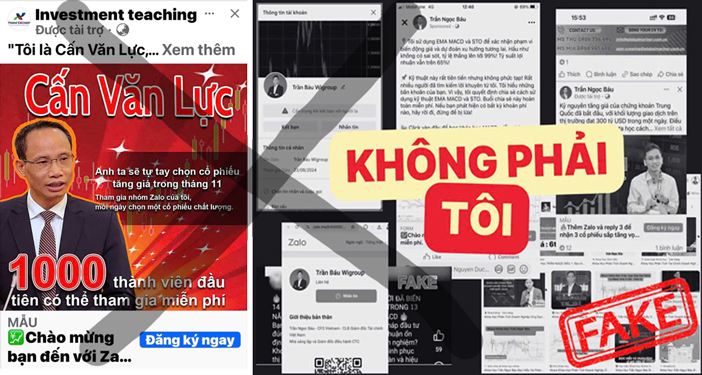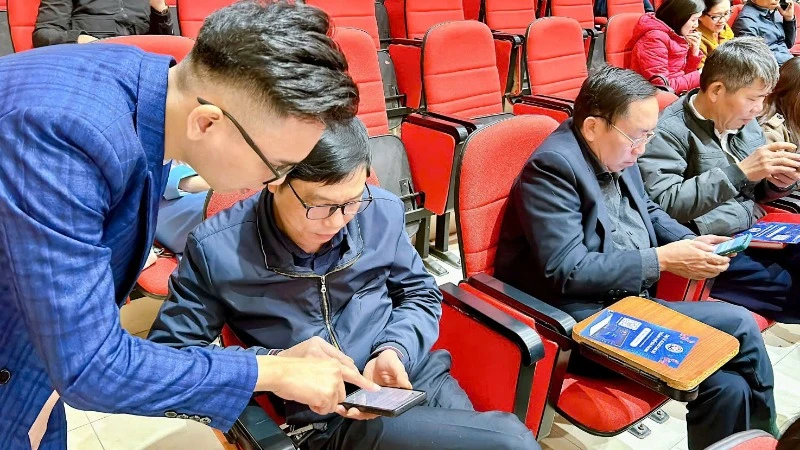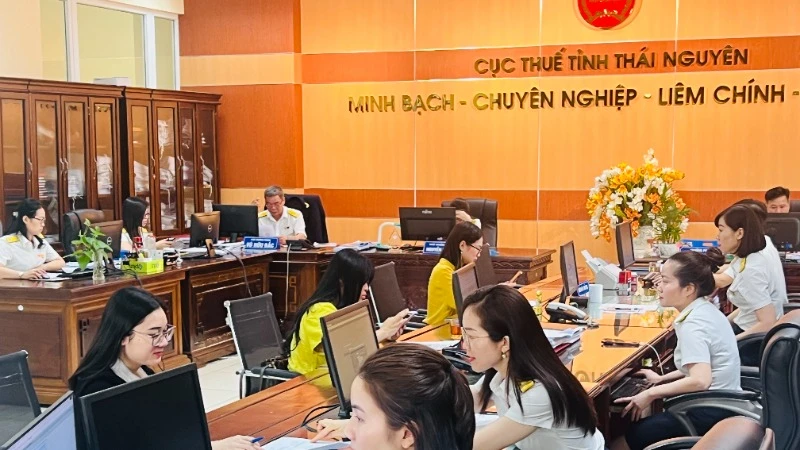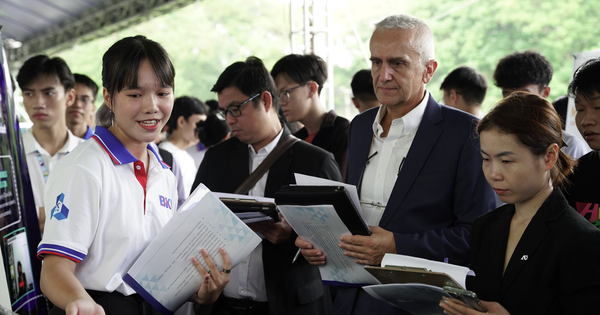Many economic experts and doctors have had to speak up to warn and advise because of impersonations inviting investment, selling get-rich-quick courses...
On December 2, speaking with a reporter from Nguoi Lao Dong Newspaper, economic expert - Dr. Tran Dinh Thien said he was very surprised to see on social networks a flood of advertisements using his image to invite investors to invest in stocks, sell investment courses, etc. He affirmed that "all are fake". Many other experts such as Dr. Can Van Luc, Dr. Nguyen Tri Hieu, etc. also have headaches because of being impersonated to invite investors.
Enough tricks to impersonate an expert
According to records, not just 1-2 pages but a series of advertisements using images of famous economic experts and doctors invite investors to join stock investment groups and associations, get rich or sell courses.
"Free stock investment course organized by financial expert Tran Dinh Thien..." - that is a sample advertisement on Facebook that this expert provided to us. "They take advantage of my image to deceive gullible people to get information or commit fraud and scams. Everyone should be careful to avoid being scammed" - Dr. Tran Dinh Thien was indignant but did not forget to remind social network users.

Fake advertisements of experts Tran Ngoc Bau and Dr. Can Van Luc are rampant on Facebook. Photo: THAI PHUONG .Photo: THANG LONG
Similarly, some other advertisements impersonate Dr. Can Van Luc with the message "join my Zalo group, choose a quality stock every day; choose stocks that increase in price..." In response, this expert confirmed that this is fake information.
"I don't use Facebook and never participate in multi-level investment training and coaching programs with such discounts. Investors and people must be very careful, it's best to cross-check. You can call or text directly to check" - Dr. Luc said.
In addition, stock investors have often encountered advertisements with the image of financial expert - Dr. Nguyen Tri Hieu such as: "I am stock expert Nguyen Tri Hieu. I use EMA MACD and STO to confirm price fluctuation range and predict future trends. Almost no errors, winning rate up to 99%! Profit rate is still over 65%...". These advertisements all include links to Zalo and Telegram groups and affirm that the programs are free and organized and taught by Dr. Hieu.
Not only experts, many securities company leaders and financial analysts also face headaches when their identities are impersonated to invite investment and sell courses.
Mr. Phan Dung Khanh, Investment Consulting Director of Maybank Securities Company, said that he himself has been impersonated many times to invite investors to join securities groups and associations; invest or sell financial products and services; promise high profits, even "guaranteed profit, guaranteed loss". There are even cases where subjects use Deepfake technology (using artificial intelligence to create images and videos) to advise in order to increase credibility and attract investors...
Or Mr. Tran Ngoc Bau, founder and Chairman of the Board of Directors of WiGroup Data and Finance Company, was also impersonated a lot on Facebook, Zalo, TikTok... with content related to investment teaching and capital entrustment... "These incidents greatly affect my reputation, life and work" - this expert said.
What is the solution?
Mr. Le Hong Duc, founder of OneAds Digital Company, said that Facebook ads that use images of experts and celebrities to sell courses, products, etc. are becoming more and more popular because registering to run ads on this platform is very easy, all you need is money.
As for verifying advertising content, verifying accounts or other issues, Facebook does not care. To prevent this situation, Mr. Duc said that management agencies, especially the Ministry of Information and Communications, need to create a support stream for users; so that when fraud or scams occur, they can report them and get them resolved quickly instead of reporting and waiting for the platform to resolve them. "My company specializes in running ads on Facebook, TikTok, YouTube, but when fake ads occur on Facebook, we cannot handle them even though we have reported them on the platform. They almost do not care about this issue" - Mr. Duc said.
According to security expert Pham Dinh Thang, it is necessary to deal with the root cause of impersonation and fraud on social networks. That is, it is necessary to educate and raise awareness of social network users through forums and communities to share information and help each other in preventing fraud. He recommends that users should not be curious about online course advertisements because most of them are scams.
"This situation of fake advertising has been going on for many years but no agency has focused on solving it. Therefore, users must equip themselves with the skills to distinguish between real and fake, and regularly update on fraud forms. If they need to learn more knowledge or buy products from online advertising, users need to contact experts or businesses directly to ensure safety and avoid losing money" - Mr. Thang recommended.
According to technology expert Huynh Huu Bang, in addition to the above solutions, he suggested that it is necessary to publicize information about economic and educational experts on the media so that people can be aware and avoid losing money on courses from fake experts. "Many people claim to be experts and advertise online to attract users to join groups to sell courses. This is also a form of fraud. Management agencies need to control to minimize risks for people in cyberspace," Mr. Bang suggested.
Dr. Tran Dinh Thien also said that there should be solutions to manage advertising activities on social networks, instead of allowing impersonation to spread as it does now. State management agencies also need to take positive and strict actions, because this greatly affects social trust.
Faced with the rampant impersonation advertising on Facebook, Mr. Tran Ngoc Bau frankly pointed out that the business practices of this platform in Vietnam are very substandard. "Facebook seems to only focus on revenue, while neglecting to control advertising content, causing many inconveniences and losses for individuals and organizations that are impersonated. In the short term, this lack of responsibility is creating conditions for financial fraud to increase.
In the long term, the consequences of these fraudulent acts do not stop at material damage, but also seriously affect the trust between Vietnamese people and the financial market. This can have a profound negative impact on the economic and social development of the country," the expert said, suggesting that the authorities should soon intervene to solve this problem.
Can I call the police?
An economic expert who was impersonated said he had contacted the police to ask how to handle the situation when his image was used to advertise courses and investments. The police said that in order to handle the case thoroughly, there must be denunciations from those who suffered losses. Therefore, the expert recommended that victims boldly report the case so that the authorities have a basis for handling it.
Lawyer Bui Thi Anh Tuyet (Ho Chi Minh City Bar Association) said that the act of impersonating experts or celebrities to fraudulently sell courses or goods can be prosecuted for the crime of "Fraudulent appropriation of property" under Article 174 of the 2015 Penal Code (amended and supplemented in 2017). This is an act of using deceitful tricks to appropriate property.
People need to learn carefully in advance to avoid being scammed and if they encounter unfortunate situations, they should immediately report to the authorities. On the part of state agencies, they need to promptly support victims and tighten management of advertisements that show signs of violating the law.
Source: https://nld.com.vn/mao-danh-chuyen-gia-noi-tieng-moi-dau-tu-ban-khoa-hoc-196241202210804295.htm



![[Photo] Overcoming all difficulties, speeding up construction progress of Hoa Binh Hydropower Plant Expansion Project](https://vstatic.vietnam.vn/vietnam/resource/IMAGE/2025/4/12/bff04b551e98484c84d74c8faa3526e0)

![[Photo] Closing of the 11th Conference of the 13th Central Committee of the Communist Party of Vietnam](https://vstatic.vietnam.vn/vietnam/resource/IMAGE/2025/4/12/114b57fe6e9b4814a5ddfacf6dfe5b7f)



























































































Comment (0)